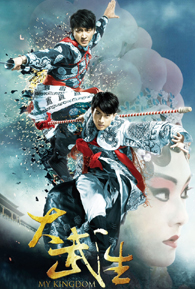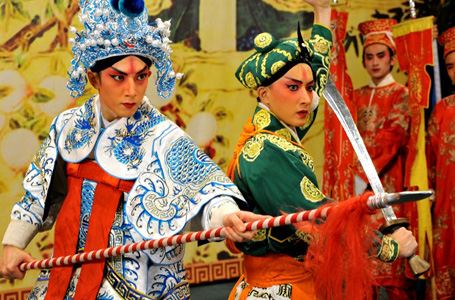
It starts like a million other such movies. An opera troupe has two favoured disciples, Yi Long (Wu Chun) and Er Kui (Han Geng), who were raised since by their stern yet kindly master Yu (Yuen Biao) as “wusheng” (specialists in combat roles in Chinese Opera). Er Kui is an orphan, the last survivor of a prominent family who were executed by the Imperial Court in the waning days of the Qing Dynasty. Yi Long never knew his parents except for a walnut talisman he carries with him. All goes well until the rival Master Yue (Yu Rongguang) arrives to challenge Master Yu in a duel. Master Yue promptly defeats his rival and leaves Master Yu’s reputation in tatters. Angered, Master Yu raises both disciples to be the best at martial arts stage combat he can, so that they may avenge him. A decade later, the two pupils arrive in Shanghai to find that Master Yue is now a renowned performer with his own troupe, and promptly defeat Master Yue one night in the theatre to a stunned audience. In disgrace, Master Yue commits suicide, and Yilong and Erkui inherit the troupe.
The beauty of this movie lies in that what you have just read, that could well serve as a self-contained little martial arts movie on its own, is only the setup of the film. This is literally a martial arts movie that starts where others end. What follows is an exemplary screenplay: richly ironic, complex and peopled by always believable characters. A cast that seems like standard fare for most martial arts films set in China’s Republican era: honour-bound martial arts masters, uppity white people, corrupt cops, decadent former Manchu princes, KMT warlords and beautiful femmes fatales are put in a new light as the film takes these stock character types and then subverts what we think we’d like to know, or what we’d expect, of the roles they play. There is no sense at any time that the characters are going through the motions to reach the expected conclusion of the film.
The resultant concoction seems to not just be an homage to the martial arts movie master Chang Cheh, in particular his masterpiece Vengeance (1970) with its intrigues set in the world of Chinese opera in Old Shanghai, but also to the dramas of Max Ophuls, in particular Letter From An Unknown Woman (1948), that both celebrate and regard romantic love with a certain irony. That the movie does both aspects with equal amounts of taste and literacy speaks to the amount of thought and craft that director Gao Xiaosong and screenwriter Zou Jingzhi have put into it.
My Kingdom plays like a lost collaboration between Chang Cheh and Max Ophuls. It’s a movie that might have existed in a better world, come right into this one.












 Printable Version
Printable Version










Reader's Comments
Please log in to use this feature.